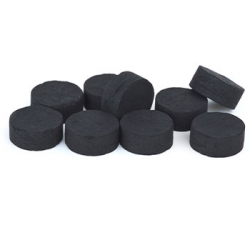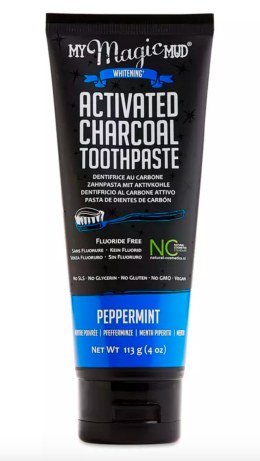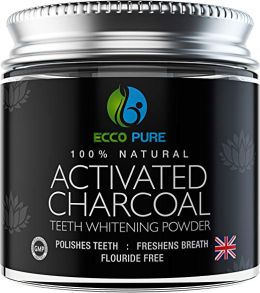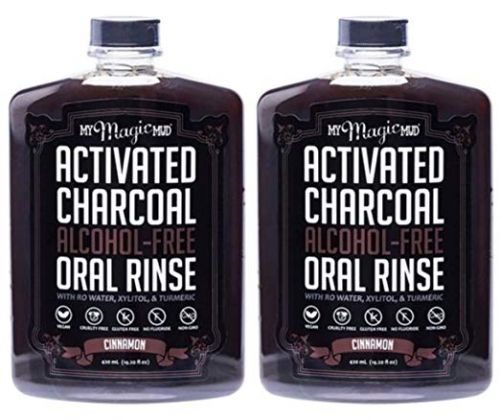Activated charcoal has been used for various medical purposes, predominantly treating cases of poisoning, due to its ability to absorb and sequester a variety of substances. Because of this, activated charcoal is now being used as a supplement, with the intention of aiding detoxification of the body. In reality, activated charcoal can also sequester nutrients as well as toxins, preventing them from being adequately absorbed into the bloodstream.

Activated Charcoal vs Other Charcoals
Charcoal is made of carbon from plant matter, typically wood or other hard materials like bamboo. When plant material is heated to a high degree in the absence of oxygen, instead of burning it undergoes structural changes. Charcoal forms when the carbon atoms arrange themselves into a highly porous network. The coals you are probably most familiar with are those that develop in the inside of burning logs, the part of the wood that is not exposed to air, which then form lightweight sooty blocks.1
Activated charcoal is made in a similar manner to these coals. However, it is heated to a higher temperature in the presence of certain types of gas. This yields charcoal that has even larger pores than regular charcoal. These large openings are able to absorb a wide variety of different substances, such as organic poisons.1


Poison Control with Activated Charcoal
Activated charcoal’s ability to sequester a wide range of molecules makes it an essential tool for treating poisoning through ingestion. If you’ve accidentally swallowed something poisonous, or your child has gotten into the cleaning supplies or medicine cabinet, call the poison control center and get yourself into the emergency room right away. The doctors there will determine if activated charcoal can be used for whatever was consumed.
The faster that activated charcoal gets into your stomach, the better. When it comes into direct contact with a compound that is the right size and has the right chemical properties, the compound gets absorbed into the pores of the carbon particle. This works to control poisoning by keeping the toxic chemicals from being absorbed into your bloodstream, instead passing harmlessly through your digestive tract.1

Antibiotic Effects of Activated Charcoal
One of the potential activities of activated charcoal is the reduction of bacteria in the gut. In animal feed lots, where livestock such as cattle, sheep, pigs, and poultry are in close quarters and fed atypical diets, antibiotics are frequently added to their feed to reduce their chances of getting sick. Activated charcoal is sometimes feed as an alternative to antibiotics to reduce bacteria in these animals, or to reduce toxicity from eating harmful plants.2-5
It is unknown currently what kinds of antibacterial effects activated charcoal may have on humans. Be aware, though: these effects likely do not distinguish between pathogenic bacteria and beneficial bacteria. Taking activated charcoal is known to have undesirable digestive effects in people. Supplementation with activated charcoal can cause gastrointestinal upset, such as constipation, vomiting, and diarrhea.6

Potential Health Benefits of Activated Charcoal Supplementation
A few potential benefits of the oral use of activated charcoal have been raised. Very small studies have found improvements in blood serum levels of cholesterol in patients with hypercholesterolemia7 and phosphate in patients with end stage renal failure.8 It may also help with bile production in pregnant women with cholestasis.9 If you are considering taking activated charcoal to manage any condition, it is critical that you discuss this with your doctor first because activated charcoal has interactions with many different medications.1 The safety of activated charcoal supplements has not yet been determined.


Activated Charcoal Supplements Absorb Nutrients and Medications
The major issue with activated charcoal supplementation is that it doesn’t distinguish between toxic compounds and beneficial ones. Taking activated charcoal on a regular basis could reduce the number of nutrients that your intestines absorb into your bloodstream. Activated charcoal can absorb fluoride, important for keeping your teeth strong and healthy,10 and potentially can absorb other vitamins and minerals.
If you recall, activated charcoal is used to treat people who have overdosed on drugs and medications. If you take activated charcoal preventatively, it can reduce the efficacy of any prescription medications you may be taking, including birth control. You should not take activated charcoal if you are taking certain other medications, including acetaminophen, digoxin, theophylline, or tricyclic antidepressants.6 Be sure to always discuss with your doctor if you are thinking of taking any supplements, including activated charcoal.
Since your liver, kidneys, and spleen do a good job removing toxins from your body on their own, it might be best that you don’t interfere with your digestion by taking activated charcoal unless needed for acute poison control.
[1] Cooney DO. 2009. Activated Charcoal in Medical Applications. Informa Healthcare USA, Inc. New York, NY. ISBN: 13: 978‑0‑8247-9300-5. https://content.taylorfrancis.com/books/download?dac=C2009-0-15893-5&isbn=9781482206883&format=googlePreviewPdf
[2] Islam MM, Ahmed ST, Kim YJ, Mun HS, Kim YJ, Yang CJ. 2014. “Effect of Sea Tangle (Laminaria japonica) and Charcoal Supplementation as Alternatives to Antibiotics on Growth Performance and Meat Quality of Ducks.” Asian-Australas J Anim Sci. Feb; 27(2):217-224. https://www.ncbi.nlm.nih.gov/pubmed/25049946
[3] Al-Kindi A, Dickhoefer U, Schlecht E, Sundrum A, Schiborra A. 2016. “Effects of quebracho tannin extract (Schinopsis balansae Engl.) and activated charcoal on nitrogen balance, rumen microbial protein synthesis and faecal composition of growing Boer goats.” Arch Anim Nutr. Aug; 70(4):307-321. https://www.ncbi.nlm.nih.gov/pubmed/27161670
[4] Poage GW III, Scott CB, Bisson MG, Hartmann FS. 2000. “Activated Charcoal Attenuates Bitterweed Toxicosis in Sheep.” Journal of Range Management. Jan; 53(1):73-78. https://www.jstor.org/stable/4003395?seq=1#page_scan_tab_contents
[5] Cabassi E, Miduri F, Cantoni AM. 2005. “Intoxication with Fumonisin B1 (FB1) in Piglets and Supplementation with Granulated Activated Carbon: Cellular-Mediated Immunoresponse.” Veterinary Research Communications.Aug; 29(2):225-227. https://link.springer.com/article/10.1007%2Fs11259-005-0048-7
[6] “Activated Charcoal.” 2016. WebMD. https://www.webmd.com/vitamins-and-supplements/activated-charcoal-uses-risks#1
[7] Neuvonen P1, Kuusisto P, Vapaatalo H, Manninen V. 1989. “Activated charcoal in the treatment of hypercholesterolaemia: dose-response relationships and comparison with cholestyramine.” Eur J Clin Pharmacol. 37(3):225-230. https://www.ncbi.nlm.nih.gov/pubmed/2612535
[8] Wang Z, Cui M, Tang L, Li W, Wei Y, Zhu Z, Jia X, Kong X, Xu D. 2012. “Oral activated charcoal suppresses hyperphosphataemia in haemodialysis patients.” Nephrology. Sep; 17(7):616-620. https://www.ncbi.nlm.nih.gov/pubmed/22697887
[9] Kaaja RJ, Kontula KK, Räihä A, Laatikainen T. 1994. “Treatment of cholestasis of pregnancy with peroral activated charcoal. A preliminary study.” Scand J Gastroenterol. Feb; 29(2):178-181. https://www.ncbi.nlm.nih.gov/pubmed/8171288
[10] Konno H, Yaegaki K, Tanaka T, Sato T, Itai K, Imai T, Murata T, Herai M. 2008. “Neither Hollow-Fibre Membrane Filters nor Activated-Charcoal Filters Remove Fluoride from Fluoridated Tap Water.” Applied Research. Jun; 74(5):443-443f. http://www.cda-adc.ca/jcda/vol-74/issue-5/443.pdf
-
Best Mouthwashes for Bad Breath
By Dr. AnnaDecember 20, 2021 -
Charcoal Teeth Whitening
By Dr. KarenDecember 26, 2021 -
Magic Mouthwash
By Dr. KarenDecember 26, 2021
Search the blog
Article Categories
- All Articles (95)
- Rating Charts (1)
- Beauty & Skincare (17)
- FAQ (0)
- Hair Care (9)
- Health & Wellness (12)
- Anti-Aging (4)
- Kid's Health (0)
- Makeup (2)
- Men's Health (2)
- Oral Care (3)
- Sunscreen (7)
- Skin Tools & Treatments (10)
- Supplements (26)
- Videos (0)












